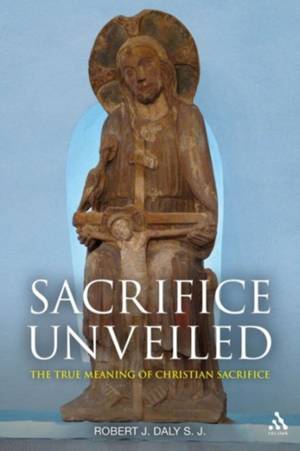
- Afhalen na 1 uur in een winkel met voorraad
- Gratis thuislevering in België vanaf € 30
- Ruim aanbod met 7 miljoen producten
- Afhalen na 1 uur in een winkel met voorraad
- Gratis thuislevering in België vanaf € 30
- Ruim aanbod met 7 miljoen producten
Zoeken
€ 390,45
+ 780 punten
Uitvoering
Omschrijving
Most ideas of sacrifice, even specifically Christian ideas, as we saw in the Reformation controversies, have something to do with deprivation or destruction. But this is not authentic Christian sacrifice. Authentic Christian sacrifice, and ultimately all true sacrifice (whether one is conscious of it or not) begins with the self-offering of the Father in the gift-sending of the Son, continues with the loving "response" of the Son, in his humanity, and in the Spirit, to the Father and for us, and finally, begins to become real in our world when human beings, in the power of the same Spirit that was in Jesus, respond to love with love, and thus begin to enter into that perfectly loving, totally self-giving relationship that is the life of the triune God.
The origins of this are in the Hebrew Bible, its revelatory high-points in Jesus and Paul, and its working out in the life of the Church, especially its Eucharistic Prayers. Special attention will be paid to the atonement, not just because atonement and sacrifice are often synonymous, but also because traditional atonement theology is the source of distortions that continue to plague Christian thinking about sacrifice.
After exploring the possibility of finding a phenomenology of sacrificial atonement in Girardian mimetic theory, the book will end with some suggestions on how to communicate its findings to people likely to be put off from the outset by the negative connotations associated with "sacrifice."
The origins of this are in the Hebrew Bible, its revelatory high-points in Jesus and Paul, and its working out in the life of the Church, especially its Eucharistic Prayers. Special attention will be paid to the atonement, not just because atonement and sacrifice are often synonymous, but also because traditional atonement theology is the source of distortions that continue to plague Christian thinking about sacrifice.
After exploring the possibility of finding a phenomenology of sacrificial atonement in Girardian mimetic theory, the book will end with some suggestions on how to communicate its findings to people likely to be put off from the outset by the negative connotations associated with "sacrifice."
Specificaties
Betrokkenen
- Auteur(s):
- Uitgeverij:
Inhoud
- Aantal bladzijden:
- 280
- Taal:
- Engels
Eigenschappen
- Productcode (EAN):
- 9780567034205
- Verschijningsdatum:
- 13/06/2009
- Uitvoering:
- Hardcover
- Formaat:
- Genaaid
- Afmetingen:
- 160 mm x 236 mm
- Gewicht:
- 566 g

Alleen bij Standaard Boekhandel
+ 780 punten op je klantenkaart van Standaard Boekhandel
Beoordelingen
We publiceren alleen reviews die voldoen aan de voorwaarden voor reviews. Bekijk onze voorwaarden voor reviews.








